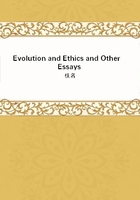
第24章
If there is one thing plainer than another, it is that neither the pleasures nor the pains of life, in the merely animal world, are distributed according to desert; for it is admittedly impossible for the lower orders of sentient beings, to deserve either the one or the other. If there is a generalization from the facts of human life which has the assent of thoughtful men in every age and country, it is that the violator of ethical rules constantly escapes the punishment which he deserves; that the wicked flourishes like a green bay tree, while, the righteous begs his bread; that the sins of the fathers are visited upon the children; that, in the realm of nature, ignorance is punished just as severely as wilful wrong; and that thousands upon thousands of innocent beings suffer for the crime, or the unintentional trespass of one.
Greek and Semite and Indian are agreed upon this subject. The book of Job is at one with the "Works and Days" and the Buddhist Sutras; the Psalmist and the Preacher of Israel, with the Tragic Poets of Greece. What is a more common motive of the ancient tragedy in fact, than the unfathomable injustice of the nature of things; what is more deeply felt to be true than its presentation of the destruction of the blameless by the work of his own hands, or by the fatal operation of the sins of others? Surely Oedipus was pure of heart; it was the natural sequence of events--the cosmic process--which drove him, in all innocence, to slay his father and become the husband of his mother, to the desolation of his people and his own headlong ruin. Or to step, for a moment, beyond the chronological limits I have set myself, what constitutes the sempiternal attraction of Hamlet but the appeal to deepest experience of that history of a no less blameless dreamer, dragged, in spite of himself, into a world out of joint involved in a tangle of crime and misery, created by one of the prime agents of the cosmic process as it works in and through man?
Thus, brought before the tribunal of ethics, the cosmos might well seem to stand condemned. The conscience of man revolted against the moral indifference of nature, and the microcosmic atom should have found the illimitable macrocosm guilty. But few, or none, ventured to record that verdict.
In the great Semitic trial of this issue, Job takes refuge in silence and submission; the Indian and the Greek, less wise perhaps, attempt to reconcile the irreconcilable and plead for the defendant.
To this end, the Greeks invented Theodicies; while the Indians devised what, in its ultimate form, must rather be termed a Cosmodicy. For, although Buddhism recognizes gods many and lords many, they are products of the cosmic process; and transitory, however long enduring, manifestations of its eternal activity. In the doctrine of transmigration, whatever its origin, Brahminical and Buddhist speculation found, ready to hand the means of constructing a plausible vindication of the ways of the cosmos to man. If this world is full of pain and sorrow; if grief and evil fall, like the rain, upon both the just and the unjust; it is because, like the rain, they are links in the endless chain of natural causation by which past, present, and future are indissolubly connected; and there is no more injustice in the one case than in the other. Every sentient being is reaping as it has sown; if not in this life, then in one or other of the infinite series of antecedent existences of which it is the latest term. The present distribution of good and evil is, therefore, the algebraical sum of accumulated positive and negative deserts; or, rather, it depends on the floating balance of the account. For it was not thought necessary that a complete settlement should ever take place. Arrears might stand over as a sort of "hanging gale;" a period of celestial happiness just earned might be succeeded by ages of torment in a hideous nether world, the balance still overdue for some remote ancestral error.
Whether the cosmic process looks any more moral than at first, after such a vindication, may perhaps be questioned. Yet this plea of justification is not less plausible than others; and none but very hasty thinkers will reject it on the ground of inherent absurdity.
Like the doctrine of evolution itself, that of transmigration has its roots in the world of reality; and it may claim such support as the great argument from analogy is capable of supplying.
Everyday experience familiarizes us with the facts which are grouped under the name of heredity. Every one of us bears upon him obvious marks of his parentage, perhaps of remoter relationships. More particularly, the sum of tendencies to act in a certain way, which we call "character," is often to be traced through a long series of progenitors and collaterals. So we may justly say that this "character"--this moral and intellectual essence of a man--does veritably pass over from one fleshly tabernacle to another, and does really transmigrate from generation to generation. In the new-born infant, the character of the stock lies latent, and the Ego is little more than a bundle of potentialities. But, very early, these become acutalities; from childhood to age they manifest themselves in dulness or brightness, weakness or strength, viciousness or uprightness; and with each feature modified by confluence with another character, if by nothing else, the character passed on to its incarnation in new bodies.